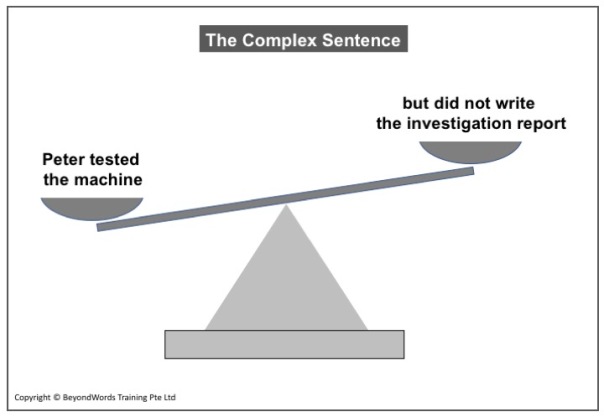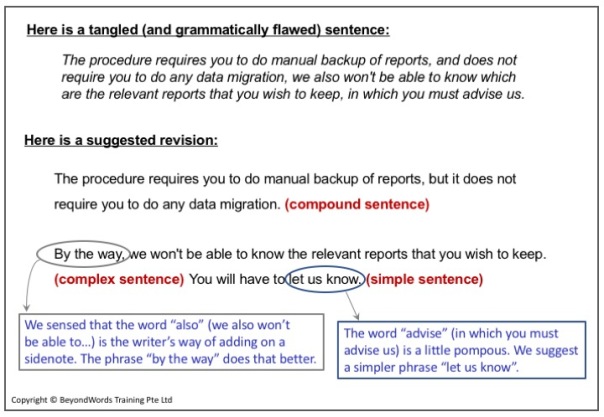In English, there are 4 sentence structures:
- The Simple Sentence
- The Compound Sentence
- The Complex Sentence
- The Compound-Complex Sentence
For business writing, I recommend that you use the first 3 structures.
I will tell you about the 3 recommended sentence structures, but first, here’s a quick explanation of what makes up a sentence.
What are Clauses?
Clauses are groups of words that make up sentences. There are 2 types of clauses:
(1) the independent clause (can exist on its own grammatically)
- usually conveys the main idea(s) in the sentence
(Eg: Peter tested the machine)
(2) the dependent clause (cannot exist on its own grammatically)
- usually conveys secondary idea(s) in the sentence
(Eg: but did not write the investigation report)
If you combine these 2 clauses, you can make a sentence.
(Eg: Peter tested the machine but did not write the investigation report.)
The 3 Recommended Sentence Structures for Business Writing
These are the 3 recommended structures for business writing:
(1) The Simple Sentence
The simple sentence consists of one independent clause.
Examples
– Peter tested the machine.
– He did not write the investigation report.
(2) The Compound Sentence
To explain this in the simplest way, the compound sentence consists of two independent clauses (joined with a linking device).
Examples
– Peter tested the machine, but he did not write the investigation report.
– Peter tested the machine; however, he did not write the investigation report.
– Peter tested the machine; he did not write the investigation report.
This structure is especially useful when you want to place equal emphasis (weightage) on both these ideas.

(3) The Complex Sentence
Again, to explain this in the simplest way, the complex sentence consists of one independent clause and one dependent clause.
Example
– Peter tested the machine but did not write the investigation report.
This structure is especially useful when you want to place more emphasis (weightage) on one idea (independent clause) and less on the other (dependent clause).

Summary
If you have only one idea to convey in a sentence, you will obviously use a simple sentence.
If you want to convey 2 ideas of equal weightage in a sentence, use the compound sentence.
If you have 2 ideas in your sentence, and you want to emphasise one over the other, use the complex sentence.
Application
In our daily writing, you will very often need to convey complex information.
Now that you know more about the 3 sentence structures you can use, put this knowledge into practice.

